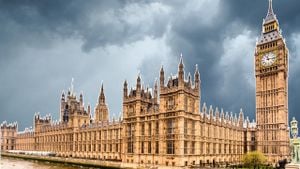Labour's plans to tackle the UK housing crisis, led by Deputy Prime Minister Angela Rayner and Prime Minister Sir Keir Starmer, have stirred significant controversy. Promising to build 1.5 million new homes over five years, the Labour government aims to address the acute shortage of housing, which sees millions languishing on waiting lists. Yet, this ambitious proposal has ignited fierce opposition, particularly over its potential impact on the green belt.
Critics from across the political spectrum express concern about the planned overhaul of local housing policies. Shadow housing secretary Kevin Hollinrake did not hold back, accusing Labour of being on a “headlong rush to build more homes” without due regard for local communities. He raised alarms about the government effectively bulldozing concerns from residents who fear losing valuable green spaces to new developments. "We are not against building more houses, but... the concern is really where they are going to be built," he stated on GB News.
According to the government's new proposals, local councils will be compelled to reassess the boundaries of existing green belt areas, allowing for developments on previously reserved land. The rationale is to focus on what the government terms "grey belt" land, which is defined as lower-quality green belt suitable for construction. Rayner firmly stated, "The question is now where, not whether, homes will be built. We expect every local area to adopt a plan to meet their housing need." This shift is significant, with Labour stipulating they need to hit targets of approximately 370,000 new homes each year.
Supporters of the government's initiative argue it’s necessary for solving the housing crisis, framing the situation as one where local authorities have not done enough to address housing shortages. Matthew Pennycook, the Housing Minister, noted on BBC Radio 4’s Today program, the government will not hesitate to intervene with councils who refuse to comply with new housing targets. “We want to support those authorities... but... we are absolutely willing to use the full range of ministerial intervention power,” he said.
Yet, opposition parties like the Liberal Democrats, along with conservation organizations such as the National Trust, argue the housing plans threaten to wreak havoc on the countryside. The National Trust explicitly criticized the Labour government’s broad definition of grey belt, warning it risks undermining some of the most valuable green spaces. Their representatives expressed grave concerns over the cumulative effects of piecemeal developments across green belt areas, fearing it could create significant harm to both the environment and communities. The trust's testimony to the House of Lords emphasized the importance of these green areas for recreation and nature access.
The Conservative Party has seized upon these sentiments, claiming Labour's housing initiative will primarily serve to benefit new migrants rather than address the needs of existing residents. Hollinrake highlighted this alarmingly, stating, “the majority of the homes they deliver will be required for people coming” as migration rules ease. This perspective paints the housing initiative as prioritizing migrants over local communities, tying immigration policy directly to the housing crisis.
On the other side of the aisle, Labour’s response has been to characterize these accusations as scaremongering. Pennycook rebuked Hollinrake’s claims, arguing, “most parts of the country have local allocation rules... non-British nationals can’t access housing.” This back-and-forth reveals the broader tensions within the UK’s political framework, highlighting how housing issues intertwine complexly with immigration policies.
Compounding the controversy is the Labour government's insistence on development not just on brownfields—previously developed land—but now on select green belt properties, prompting residents to voice their displeasure. The effects of Labour’s long-term housing strategy are already palpable, as eager developers eye the grey areas of the green belt for lucrative housing projects, theoretically easing the housing crisis but at what cost to the environment?
Local authorities now face strict deadlines to update their local development plans or risk having new targets imposed upon them for the following six years rather than five. Councillor Adam Hug from the Local Government Association stressed the need for cooperation, stating the urgency for more constructive dialogues between local councils and the government to manage land use effectively.
This whole situation spins on the perception of fairness and necessity. Labour’s critics accuse them of ignoring local feedback and slapping down “Whitehall diktat” on communities who often know their needs best. The call for more affordable and community-led housing solutions echoes through the halls of Parliament as voices for the communities crown the call for caution.
Given the circumstances, the stakes remain high as the government balances bold housing ambitions with the need to respect and incorporate the voices of local communities. The green belt is not just land; it symbolizes the environment and the communities’ access to natural spaces. The Labour government faces the dual challenge of addressing urgent housing requirements without alienation or disenfranchising the same communities they seek to house.
With the larger housing debate significantly hinging on Labour's plans moving forward, it begs the question: How will the government address local concerns and environmental impacts without stifling their housing policy’s ambitious goals? It’s clear the future of housing development must account for more than just numbers—it must resonate with the aspirations and desires of those who will live amid the change.



